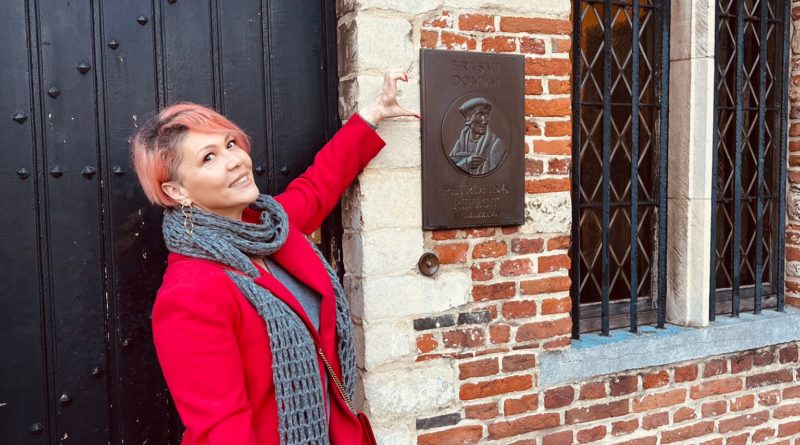“Thanks to the Erasmus+ program I gained many friends” – teacher Manuela Gheorghe from Vulcana Băi village
Between 2012-2021, Manuela Gheorghe was the director of the Ion Mareș Secondary School in Vulcana Bai village, Dâmbovița county. He has been working here since 1998 when he graduated from the Carol I Normal School in Campulung Muscel. She loves children, that’s why she became a teacher, then a teacher for primary education, after graduating from the studies of Romanian language and literature and English language at Spiru Haret University. He coordinated educational projects financed by the COMENIUS, POCU and, for several years, ERASMUS+ programs. Although life has not been easy for Manuela, she is always on her lips and has a kind word for everyone. I think that the job of a teacher fits her like a glove and I am convinced that all the children from all the graduations (hers and the school’s) loved her. In fact, you can’t help but love Manuela. She listens to stories with her warm voice and knows how not only to listen, to share, but also to comfort. Today, she is one of the 38 Erasmus+ Romania Ambassadors.
MN: – When did you discover that you would like to write and implement projects?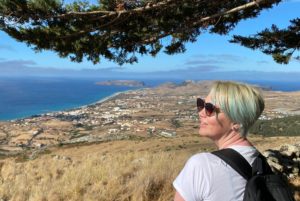
M.G.: – I don’t know if it was a discovery. Everything happened in stages, but it is clear to me that the job of “teacher” needs continuous refreshing if you don’t want to get into a routine. I think that the passion for different activities, extracurricular activities, started during the time when I was an educational counselor and I was looking for “different” activities that would attract our students and, at the same time, cover some needs of the school and the community.
M.N: – When did you find out about the Erasmus + program?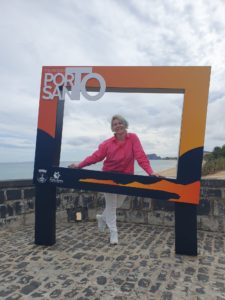
M.G.: – My first step into the world of Erasmus (Socrates at the time) was, in fact, a step back. I returned to the school from the meeting with the inspector of European programs from the county and said to myself: “It’s impossible if you don’t speak a foreign language.” But easily, easily, as a European program manager assigned in the school, I learned a foreign language, I learned to write individual projects, then strategic partnership, I was both a partner and a coordinator. From each one I got involved responsibly, I learned something. As I like to say, I wasn’t just involved in the program, I became a part of it. ERASMUS+ has become a way of life with all his grandparents and relatives ( Comenius- individual scholarships, partnerships, Regio, study visits), Grundtvig.
M.N.: – Tell me about the advantages did the Erasmus+ projects bring to the children in your school? What about the teachers?
M.G.: – The openness that Erasmus+ offers, the change of mentality, the reset, the exit from the routine, the diversity, the novelty. As director, for 10 years I included in the institutional development plan several targets regarding the development of the school through European projects. “The development of quality continuous learning and the promotion of high performance through cooperation with similar European institutions and the adoption of good practices in the field of education”/ “The development of students and teachers of communication skills in the languages of European circulation and to use the new technologies of communication and information”.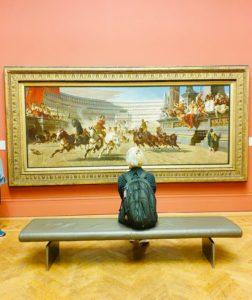 /”Supporting students who are less motivated and less supported by their families in order to acquire the basic skills and competences necessary for their personal development, improving school results, for future professional activity and for an active European citizenship.” The teachers in the school benefited from training courses, job shadowing activities, mobilities within the partnerships. Students, too: most students traveled abroad for the first time. Language skills, motivation to learn and school results have increased considerably. We have all developed professionally and personally on the path of European projects. Thanks to the Erasmus+ program, I have made so many friends, not only from outside the country, but also from within the country, people next to us that we never interacted with before. Relations at school have improved, we are all friends now, teachers and students.
/”Supporting students who are less motivated and less supported by their families in order to acquire the basic skills and competences necessary for their personal development, improving school results, for future professional activity and for an active European citizenship.” The teachers in the school benefited from training courses, job shadowing activities, mobilities within the partnerships. Students, too: most students traveled abroad for the first time. Language skills, motivation to learn and school results have increased considerably. We have all developed professionally and personally on the path of European projects. Thanks to the Erasmus+ program, I have made so many friends, not only from outside the country, but also from within the country, people next to us that we never interacted with before. Relations at school have improved, we are all friends now, teachers and students.
M.N.: – What does the development of a modern educational process include?
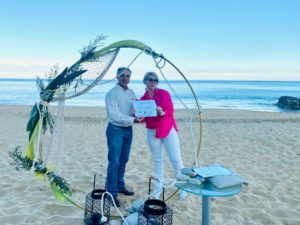 M.G.: – Beyond the development of projects that involve special activities in schools and mobility of teachers and students in European countries, interaction with teachers and students from partner schools, new methodologies, advanced and digital technology through the use of digital applications and smart boards, the modern educational process includes increasing the self-esteem of some rural students and their well-being, better said the joy of coming to school.
M.G.: – Beyond the development of projects that involve special activities in schools and mobility of teachers and students in European countries, interaction with teachers and students from partner schools, new methodologies, advanced and digital technology through the use of digital applications and smart boards, the modern educational process includes increasing the self-esteem of some rural students and their well-being, better said the joy of coming to school.
M.N.: – Although it doesn’t seem like it, there are still few educators in schools who haven’t discovered the advantages of the Erasmus+ program or don’t understand them. What do you convey to some and others?
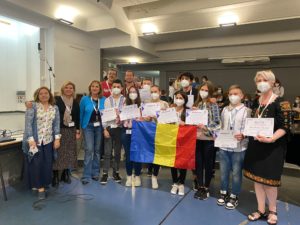 M.G.: – I wish that there is no teacher in Romania who does not know and does not benefit from this program. In this sense, I am also stimulated by a response I received when I enrolled in a professional training course with several colleagues from the county whom I did not know. When we introduced ourselves, the trainer stopped me before I could say my name and told everyone … Manuela Gheorghe from Vulcana-Băi … with the European projects! If a small rural school managed to implement, in the last 12 years, more than 12 strategic partnership projects and dozens of other individual projects, it is clear that “a pebble can change the course of a river”.
M.G.: – I wish that there is no teacher in Romania who does not know and does not benefit from this program. In this sense, I am also stimulated by a response I received when I enrolled in a professional training course with several colleagues from the county whom I did not know. When we introduced ourselves, the trainer stopped me before I could say my name and told everyone … Manuela Gheorghe from Vulcana-Băi … with the European projects! If a small rural school managed to implement, in the last 12 years, more than 12 strategic partnership projects and dozens of other individual projects, it is clear that “a pebble can change the course of a river”.
This is what I want to convey to everyone, now in a dual role, not only that of project coordinator, but also that of Erasmus+ Ambassador, which I have fulfilled with love for almost a year. And I end with a confession: in the last years, years, with hard trials for me and great losses, Erasmus+ helped me get up, gave me strength, was my therapist.
Erasmus+ doesn’t just change lives, it helps hearts beat and minds create!

